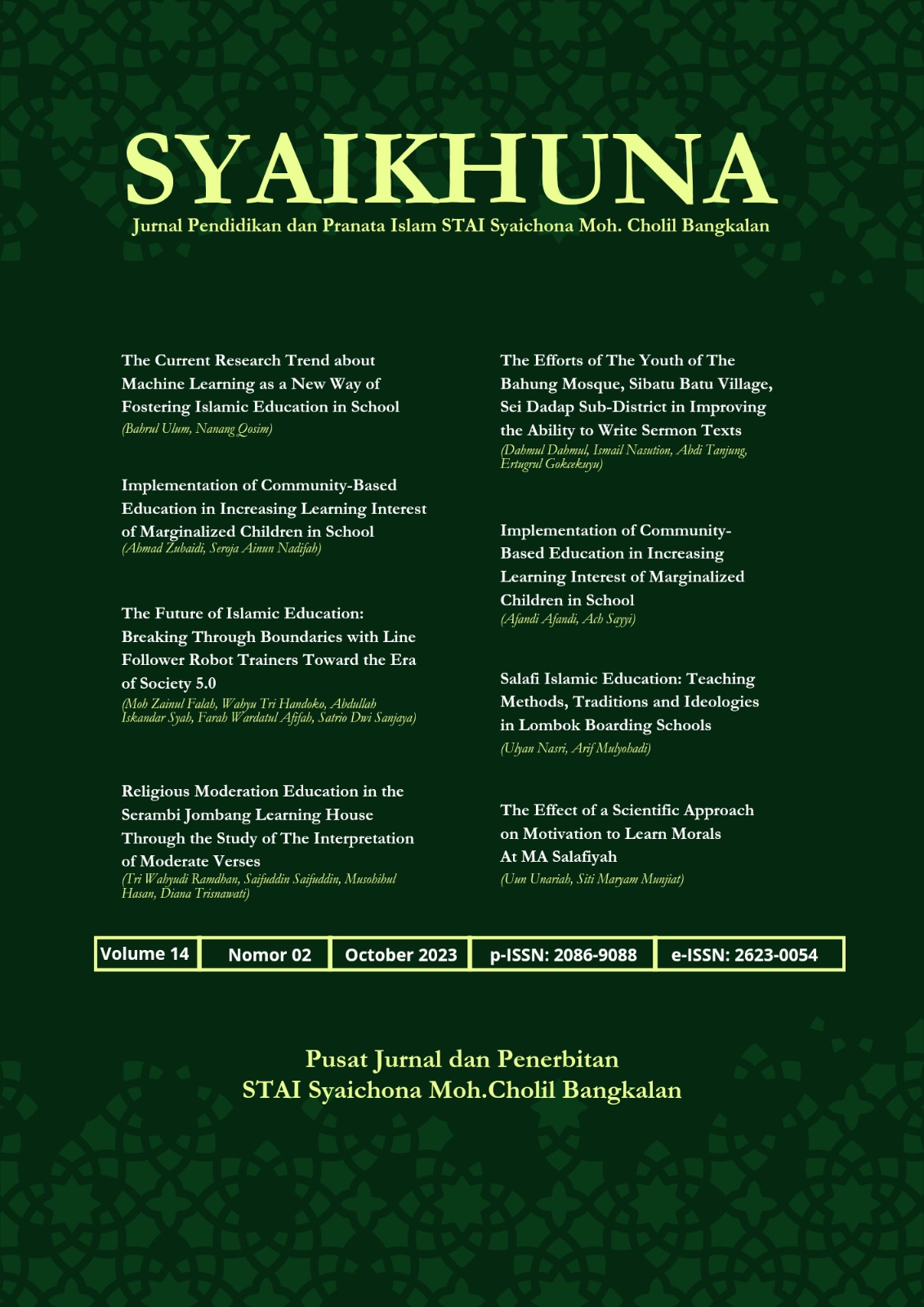The Future of Islamic Education: Breaking Through Boundaries with Line Follower Robot Trainers Toward the Era of Society 5.0
DOI:
https://doi.org/10.58223/syaikhuna.v14i02.7114Keywords:
Line Follower Robot Trainer, Islamic Education, Society 5.0 eraAbstract
This research aims to identify and implement the Line Follower Robot Trainer as an innovative effort to advance Islamic education in facing the Society 5.0 era. The research focuses on SMK NU 1 Karanggeneng, Lamongan, as a case study, where robotic technology is used as a learning tool to integrate Islamic concepts with technological advances. This research proposes the Research and Development (R&D). The results showed that using the Line Follower Robot Trainer significantly improved students' understanding of their technological skills. The survey showed that most students (85%) felt more engaged and excited about learning Islam with the help of the Line Follower Robot Trainer. Students reported higher levels of engagement in learning with the robot, and teachers expressed positive support for using this technology in learning. These positive results reflect the potential of technology in enriching students' experiences in preparing for changes in the evolving Society 5.0 era. This research provides a greater understanding of the role of technology in supporting Islamic education, bridging the gap between tradition and innovation, and bringing Islamic education into an increasingly digitized future. The implications of this research can help Islamic education institutions utilize technology as a powerful tool to spread religious values and prepare students to face an increasingly digitally connected era.References
Amelia, U. (2023). Tantangan Pembelajaran Era Society 5.0 dalam Perspektif Manajemen Pendidikan. Al-Marsus: Jurnal Manajemen Pendidikan Islam, 1(1), 68–82.
Amin, K., & Siregar, M. (2022). Sheikh Nawawi Al-Bantani: Thoughts, Educational and Relevance to Islamic Contemporary Education. Syaikhuna: Jurnal Pendidikan Dan Pranata Islam, 13(02), 109–121. doi: 10.36835/syaikhuna.v13i02.5694
Arifin, Z., Sahil, I., & Rosyid, J. (2022). Analysis of Compatibility Between Curriculum 2013 and the Concept of Islamic Education. Syaikhuna: Jurnal Pendidikan Dan Pranata Islam, 13(01), 54–69. doi: 10.36835/syaikhuna.v13i01.4603
Dalimunthe, D. S. (2023). Transformasi Pendidikan Agama Islam: Memperkuat Nilai-nilai Spiritual, Etika, dan Pemahaman Keislaman dalam Konteks Modern. Al-Murabbi: Jurnal Pendidikan Islam, 1(1), 75–96.
Dinata, S., & Achadi, M. W. (2023). Ki Hajar Dewantara’s Learning Concepts & Kadar M. Yusuf’s and Its Relevance in The Era of Society 5.0. Syaikhuna: Jurnal Pendidikan Dan Pranata Islam, 14(01), 52–70. doi: 10.58223/syaikhuna.v14i01.6445
Faiz, M. R., Falah, M. Z., & Syah, A. I. (2022). Development of Teaching Modules for Operation and System Stability Courses as a Pilot Project for the Electrical Engineering Study Program Towards Independent Learning. International Journal of Research in Vocational Studies (IJRVOCAS), 1(4), 41–45.
Fukuda, K. (2020). Science, technology and innovation ecosystem transformation toward society 5.0. International Journal of Production Economics, 220, 107460.
Hafizon, A., & Amril, M. (2023). NILAINISASI ILMU DALAM ERA GLOBALISASI (SEBUAH UPAYA INTEGRASI ILMU DAN PEMBELAJARAN). Jurnal Penelitian Ilmu Pendidikan Indonesia, 2(2), 169–175.
Hanipah, S. (2023). Analisis Kurikulum Merdeka Belajar Dalam Memfasilitasi Pembelajaran Abad Ke-21 Pada Siswa Menengah Atas. Jurnal Bintang Pendidikan Indonesia, 1(2), 264–275.
Hasan, M. S., & Aziz, A. (2023). Kontribusi Pendidikan Islam Dalam Pengembangan Sosial Emosional Peserta Didik Di MTs Salafiyah Syafiiyah Tebuireng Jombang. Irsyaduna: Jurnal Studi Kemahasiswaaan, 3(2), 143–159.
Imamah, Y. H., Pujianti, E., & Apriansyah, D. (2021). Kontribusi guru pendidikan agama islam dalam pembentukan karakter siswa. Jurnal Mubtadiin, 7(02). Retrieved from http://journal.an-nur.ac.id/index.php/mubtadiin/article/view/153
Nur, M. H., & Sulastri, E. (2023). PENDIDIKAN ISLAM PERSPEKTIF AL-QUR’AN: MENYONGSONG MASA DEPAN YANG BERKUALITAS. Maktabah Borneo, 2(1), 1–12.
Rochmanto, R. A., Rizal, A., Apriantoro, R., Sayekti, I., Kusumastuti, S., Nursaputro, S. T., … Kartika, V. S. (2023). PELATIHAN PERAKITAN ROBOT LINE FOLLOWER DIGITAL UNTUK SISWA SEKOLAH ALAM NURUL FURQON REMBANG. Community Development Journal: Jurnal Pengabdian Masyarakat, 4(2), 3366–3373.
Setiawan, D., AF, M. A., Aziz, F. M., Fajar, A., & Yurna, Y. (2023). Pandangan Filsafat Pendidikan Islam Terhadap Manusia Dan Masyarakat. Pendekar: Jurnal Pendidikan Berkarakter, 1(4), 52–63.
Sujito, S., Elmunsyah, H., Sumarli, S., Syah, A. I., Falah, M. Z., & Nugroho, Z. S. (2022). PENGEMBANGAN TRAINER AIR CONDITIONER (AC) UNTUK MENINGKATKAN KOMPETENSI KEAHLIAN TEKNIK KENDARAAN RINGAN OTOMOTIF PADA ERA SOCIETY 5.0 DI SMK NU 1 KARANGGENENG. Prosiding Hapemas, 3(1), 165–171.
Wahid, L. (2023). PERAN GURU AGAMA DALAM MENANAMKAN KESADARAN SOSIAL PADA SISWA DI SEKOLAH MENENGAH. Jurnal Review Pendidikan Dan Pengajaran (JRPP), 6(2), 605–612.
Yuangga, K. D. (2023). Transformasi Digital dalam Pendidikan Ekonomi: Menyiapkan Generasi Muda untuk Menghadapi Tantangan Ekonomi Digital. JIIP-Jurnal Ilmiah Ilmu Pendidikan, 6(6), 4507–4517.
Downloads
Published
How to Cite
Issue
Section
License
Copyright (c) 2023 Moh Zainul Falah, Wahyu Tri Handoko, Abdullah Iskandar Syah, Farah Wardatul Afifah, Satrio Dwi Sanjaya

This work is licensed under a Creative Commons Attribution 4.0 International License.





